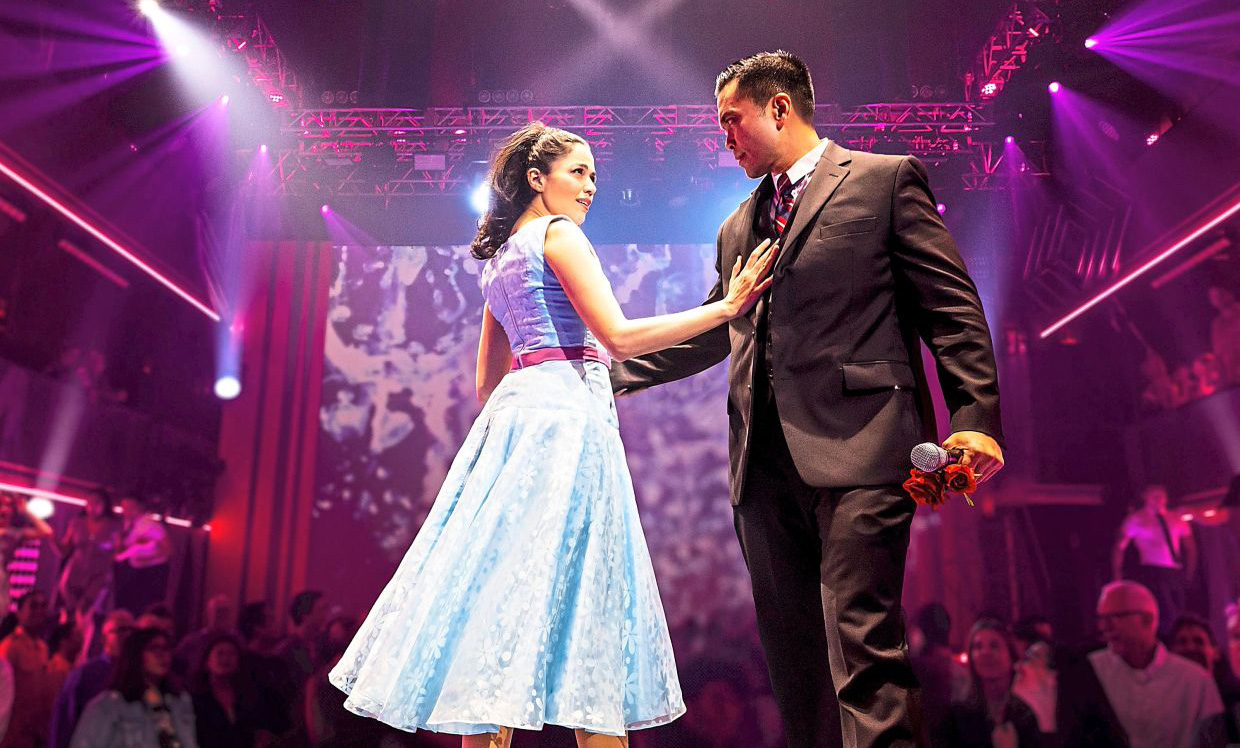Here Lies Love is making waves as the first Broadway musical with an all-Filipino cast. Based on music legends David Byrne and Fatboy Slim’s 2010 concept album of the same name, Here Lies Love depicts the life of the former First Lady of the Philippines Imelda Marcos, her late dictator husband Ferdinand Marcos and their rise to fame and sudden fall, from the 1960s to 1980s.
Its producers include Tony winner (and Broadway and Disney legend) Lea Salonga, comedian Jo Koy and Grammy-winning musician H.E.R. At first glance, it seems like a real win for Filipino representation.
However, the musical is causing a stir on social media, namely for being a “too-glossy retelling” of the Marcos family’s criminal and violent past.
So let’s dive in, shall we?
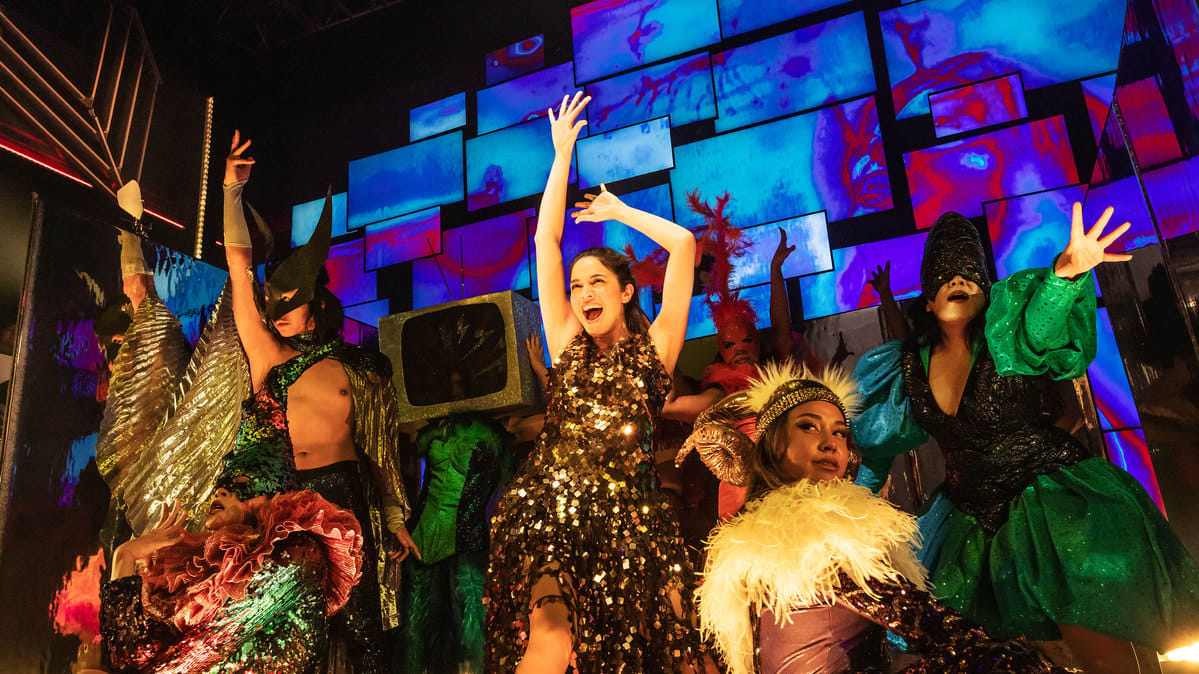
Arielle Jacobs and the cast of “Here Lies Love.” (Photo by Billy Bustamante, Matthew Murphy, and Evan Zimmerman)
As the real story goes, Ferdinand ruled over the Philippines for 21 years. During that time, the couple used billions in public funds as their own piggy bank, accumulating a hefty personal fortune. As the pair lived lavishly, refusing to even slightly hide their wealth, the country was experiencing an economic crisis and was steeped in massive debt.
In February 1986, the People Power Revolution unseated the Marcoses, forcing the family into exile. After Ferdinand died in 1989, the family was allowed to return, and Imelda was eventually convicted on corruption charges. She also, perhaps surprisingly, was elected four times to the House of Representatives of the Philippines.
The wildest twist: the pair’s son, Bongbong, is currently president of the Philippines, bringing the family’s history back into the glaring spotlight.
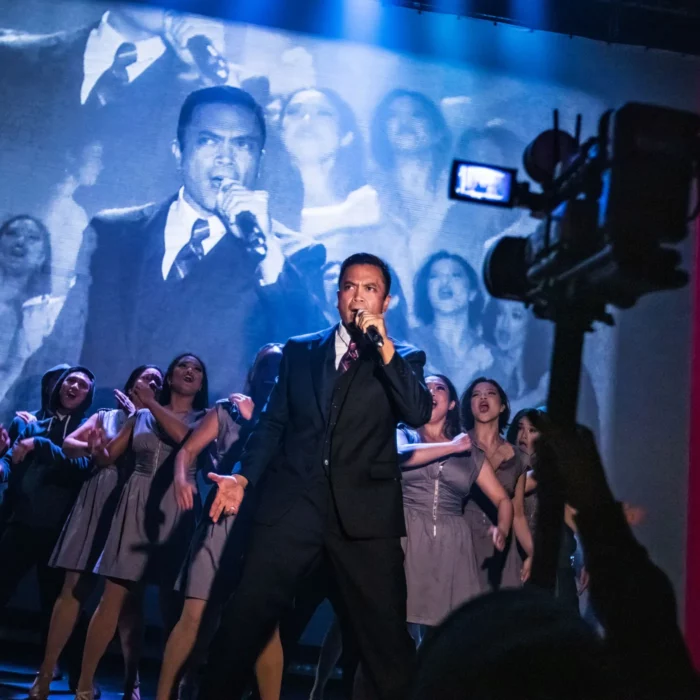
Jose Llana as Ferdinand Marcos. Photo by Billy Bustamante, Matthew Murphy, and Evan Zimmerman
There’s no denying the Marcos’ history is a shady one. But if you were only to watch Here Lies Love for a history lesson, you might not be quite so aware of that. Although the production does touch on how and why the couple lost their power, some Filipinos who have watched the show feel disheartened.
After its run in Seattle, in 2017, artist and activist Sara Porkalob wrote in The Stranger, “Here Lies Love paints a glossy veneer over the Philippines’ national trauma and America’s role in it. No amount of disco can repair that.”
Indeed, much of the show takes place on a dance floor. Byrne previously told CBS News he read Imelda “loved going to discos” and had a mirror ball installed in her New York townhouse. “I thought, maybe this is a story that can be told in that way.”
Additionally, the choreography encourages audience members to dance along during recreations of line dances and political rallies. An interesting choice!
However, much of the cast has noted just how valuable it’s been to be Filipino actors playing Filipino characters — a rarity.
For actress Arielle Jacobs, who plays Imelda, Here Lies Love has provided a chance to get in touch with her family history, which was rarely discussed when she was young. Her grandfather was a Filipino scout for the U.S. Army during World War II, during a time when the Philippines was an American colony.
She said to Playbill, “Being able to step into: This is who I am. And this is where my family’s from…I feel like there is a reckoning there. There is a reclaiming. And there’s a wanting to put roots down in a place where we were uprooted from.”
Speaking with the Times, Salonga said she hopes — despite the controversy — Here Lies Love will at least become an inspiration for more Filipino shows like it.
“I want to see other communities of colour be able to look at Here Lies Love and go, ‘We can do that. We have these stories that we are able to tell. We are going to be able to do this.'”
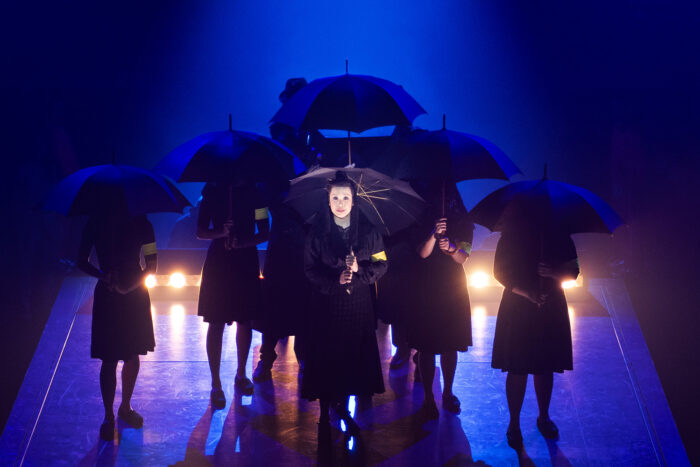
Lea Salonga as Aurora Aquino. Photo by Billy Bustamante, Matthew Murphy and Evan Zimmerman
Still, it’s important not to forget that Here Lies Love is a show entirely made up and crafted by white men, which means the story of who Imelda is and what she did is being told through a white male perspective.
Which brings us back to Byrne, and the reason he created Here Lies Love.
“It’s not like I want to glorify [Imelda], but I want to start with, as much as possible, a clean slate,” Byrne told CBS. She has a history, she has a story, but I want you to start with a person and kind of try and understand what made her do the things that she did.”
That empathy has been side-eyed by many in the Filipino community. Alex Timbers, the white director of every Here Lies Love production, told NBC News that he sees it both ways.
“I think her story is intoxicating because it’s the classic tale of someone who grew up with nothing. But she also characterizes the power of greed and the moral relativism that can occur when people obtain power. It’s a Cinderella story in some ways, but also an incredibly terrifying story in others,” he said.
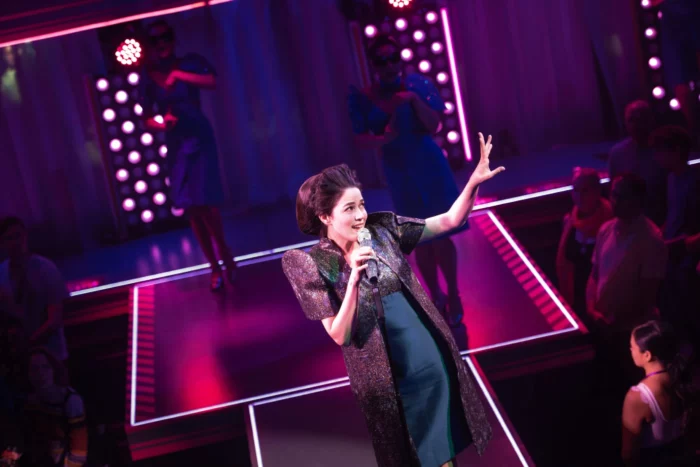
Arielle Jacobs as Imelda Marcos. Photo by Billy Bustamante, Matthew Murphy and Evan Zimmerman.
Like we said, social media has served up a fair bit of backlash. On X (formerly Twitter), Filipina writer Bettina Makalintal aptly noted, “How do you write about this musical coming to broadway now without mentioning the very crucial context of the Marcos family laundering their public image to get back in power in the Philippines?”
And in a recent reddit post, user @applekitkats wrote, “With the Marcoses alive and in power, this musical becomes dangerous. Even if they claim they are anti-Marcos, this musical can be warped into propaganda. I have to keep repeating this over and over and over again, but native Filipinos, currently, do NOT have time to find nuance in a family that has been stealing so, so much from us. While Americans can enjoy this musical in all its glory, be informed, and be entertained, we cannot, so YOU are literally profiting from our suffering.”
It’s worth noting, that, um, Imelda herself loves the show. In 2010, after seeing an original version of it, she told the New York Times, “I’m flattered; I can’t believe it!” That certainly says a lot.
In light of the backlash, the show’s producers released the following statement: “History repeats itself. Democracies all over the world are under threat. The biggest threat to any democracy is disinformation, Here Lies Love offers a creative way of re-information — an innovative template on how to stand up to tyrant. We cannot tell the modern history of the Philippines without the United States. They’re intertwined.”
Later, the statement also declares, “Here Lies Love is an anti-Marcos show. It is a pro-Filipino show, being told in a quintessential American form: the Broadway musical. Two cultures, two histories, continuing a centuries-old complicated dance.”
At the end of the day, what we can learn from Here Lies Love is that, while it’s okay to celebrate Filipino representation, it’s also important to take a peek behind the curtain and see who is telling the story. And how does everything from the setting to the music add or take away nuance from a real-life historical event?
Like Salonga said, hopefully this production will lead to more Filipino shows after it, encourage more theatres to take on Filipino creatives, and trust them to tell their own stories.
After all, who can share our pasts better than our own communities?
Like this post? Follow The RepresentASIAN Project on Instagram, TikTok and YouTube to keep updated on the latest content.







